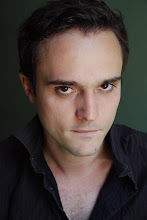Plot: Franklin Gibbs, a man morally opposed to gambling, grudgingly accompanies his wife to Las Vegas after she wins an all-expenses-paid trip. After winning on his first try, Franklin succumbs to "the fever," imagining himself being chased by a mobile slot machine that calls his name.

According to The Twilight Zone Companion, gambling machines were illegal in California when the episode was shot. The only way the crew was able to dress the casino set was by borrowing confiscated machines from he police impound -- and the machines had to be accompanied by a police officer at all times.
Worst episode ever? Time will tell. We're introduced to Franklin, who seems determined to ruin his wife's vacation by constantly reminding her how amoral gambling is. His wife won the trip due to her "knack with a phrase," a vague reference whose implications we're left to guess at. The moment Franklin wins a small sum on a slot machine, though, he goes from staunch penny pincher to full-blown gambling maniac. His abrupt, absurd 180 reminds me more than a little of Reefer Madness, the 1930's anti-drug propaganda film that had a "good boy" become a murderous, laughing maniac after a few puffs on a joint.

Franklin is haunted by the mechanical voice of a slot machine calling his name, that audible effect being perhaps the one saving grace of the episode. His mania escalates to the point that he visualizes the machine stalking him, and falls through a window to his death. No level of acting or intensity of background music can make up for how head-slapingly bad this is.

Still, my biggest problem with this episode is its flawed ideology. Franklin is a jerk when he's righteous and a psycho when he's addicted. What's the moral here? That there's something despicable about all people? I suppose you could say "take all things in moderation," but that's negated when Franklin instantly becomes an addict, as if moderation isn't an option. It's just a poor episode all around.












